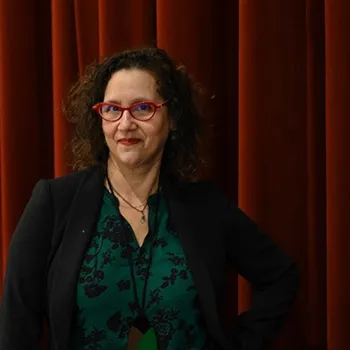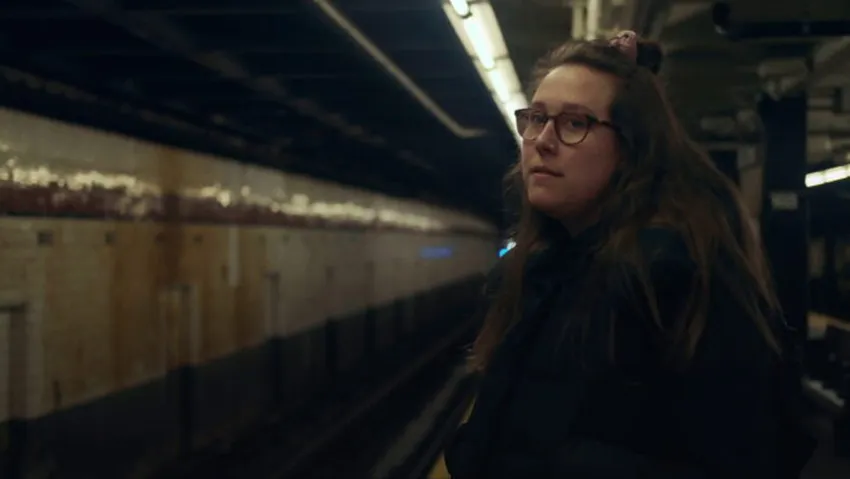The 29th annual Seattle Jewish Film Festival (SJFF) kicks off on Saturday, March 2, at downtown Seattle's Pacific Place Cinema with a gala screening of the award-winning drama One Life, starring Anthony Hopkins, complete with pre-show music, dancing, truffle popcorn, and mocktails. It concludes Sunday, March 17, at the Stroum Jewish Community Center with the silent feature The Man Without a World, coupled with a live score composed and performed by world-renowned klezmer violinist Alicia Svigals and silent film pianist Donald Sosin.
I asked longtime SJCC Director of Arts + Ideas and Festivals Pamela Lavitt a series of ten questions about this year's SJFF. Here's what she had to say:

Sara Michelle Fetters: We're back! It's time for the 29th annual Seattle Jewish Film Festival! With a little over a week before you kick things off, how are feeling right now? What's the excitement level?
Pamela Lavitt: We are excited about how the festival theme, "Lights, Camera, Community!," selected last spring, reflects the Stroum Jewish Community Center's mission of offering profound experiences that amplify Jewish life and culture for everyone and every generation. It also speaks aspirationally and inspirationally to the need people have for deeper connection and community.
In addition to two full weeks of cinema, SJFF offers more wrap-around engagement programming this year, with food, fanfare, and opportunities for socializing and conversation, such as our first Red Carpet Oscars Party.
Opening Night kicks off with a DJ plus dancing before the film. Brunch serves up Jewish comfort food [from] Hey Bagel! and klezmer music before the show. Each Midday Matinee includes "cinenoshes," and Closing Night features a silent film with a live score performed by world-renowned violinist Alicia Svigals, a founder of the Grammy-winning Klezmatics, and celebrated silent film pianist Donald Sosin.
SJFF lights up theaters and in homes. It turns camera lenses on nuanced stories of local and global Jewish life and culture to strengthen community. In the best and worst of times, community is what lifts us up and keeps us connected and in conversation.
SMF: This festival is being held in the shadow of the events of October 7. Antisemitism in the United States has reached unprecedented levels. There are those who look at what is happening in Israel and Palestine and are horrified. How hard is it to prepare, staff, and plan a film festival that, at its core, is a celebration of community, artistic achievement, and humanity with all of this going on in the background?
PL: While I can't address the geopolitical questions, as the festival's artistic director, I can share that our curation process began in spring 2023, so all of the films submitted and considered predate the current moment and climate.
In keeping with SJFF's goal to showcase the vibrancy and diversity of global Jewish life through independent, international cinema, this year's festival features 18 film programs from around the world – Hungary, India, Mexico, Poland, Israel, Italy, the UK, and more.
The Stroum Jewish Community Center – and by extension SJFF – is focused on our mission to be the most open and welcoming community-centered Jewish organization in the Puget Sound region. We are proud to be a gathering place for our community to engage with one another and build profound connections.
As a capstone public program of SJCC, SJFF's mandate is to also focus on our local community, highlighting our region's unique Sephardic Jewish community (Judeo-Spanish-speaking Jews from Turkey, Rhodes, and Greece who trace their roots to the Spanish Expulsion).
Other spotlights, like our annual Gay Gezunt! LGBTQ+ films; Call Me Dancer, about a Mumbai break dancer and his Israeli ballet teacher; and Rabbi on the Block, about a Black Jewish rabbi and activist, are all programmed to build connections, not to focus on what divides us. Yes, we are living through tumultuous times, with a 400% increase in antisemitic incidents nationally and locally (according to the ADL), which makes this film festival more important than ever as a result.
SMF: For you personally, and for everyone you work with at the SJCC, what has this period been like, balancing current events with preparing the festival?
PL: SJFF's goal is to build connections, illuminate perspectives, increase understanding, and offer experiences that amplify profound Jewish experiences for everyone. We are focused on bringing our community together for another year of amazing Jewish film and togetherness. Community lifts us up and holds us together. People want and need to feel connected and celebrate the nuance and diversity of Jewish life, history, and culture locally and globally. It takes a lot of planning and effort to prepare for the festival, and deliver much-needed joy and films with a broad lens on Jewish life and culture.
SMF: Let's turn back to this year's lineup, and once again, you've all done a spectacular job crafting an engaging, thought-provoking gaggle of films spanning multiple genres. You open things with One Life, the hotly anticipated drama starring Oscar-winner Anthony Hopkins that just took home the coveted Audience Award at the 2024 Palm Springs Film Festival. With so many great selections, how difficult was programming this year? I bet you had to make some hard decisions.
PL: With almost 300 films considered, and a shortlist of 50, this year was very competitive for sure. Some obvious choices were selected, such as Avi Nesher's latest, Monkey House, and the Moroccan women-centered drama Seven Blessings, both runaway Ophir winners (Israel's Academy Awards), as well as crowd-pleasers such as Remembering Gene Wilder and The Catskills.
Our submission process yields some hidden gems, such as The Secret Sabbath, about Hispanics in Mexico and the US tracing their Jewish roots; and Queer and Frum, part of our LGBTQ+ Spotlight. Two documentaries in the lineup, Rabbi on the Block and Vishniac, are the latest from past SJFF directors Brad Rothschild and Laura Bialis. And, although Tasveer, Seattle's South Asian Film Festival, screened Call Me Dancer this year, we loved the film so much, we wanted to reprise it.
Honestly, the biggest challenge of programming this year was deciding what films to show in person only, virtually only, or both, and how to predict successful ticket sales based on that. Many filmmakers, studios, and distributors are pulling back on virtual access, so this year, only half of our films are streaming.
We really want to remind people of the joy of experiencing films together, so we've curated events to encourage people to get off the couch and back into the theater, and Opening Night delivers the whole package! One Life is an outstanding film featuring an incredible cast (based on a beloved story; the documentary Nicky's Family won SJFF's Audience Choice Award in 2011). The evening also includes a pre-film DJ-and-dance party to kick off the night before being blown away by Oscar-winner Sir Anthony Hopkins' moving performance.
SMF: Talk to me about those Gay Gezunt! selections. Why The Holy Closet? Why this year's short selection Queer and Frum?
PL: The Holy Closet, an outstanding independent film, is a celebratory, heartfelt, and often humorous exploration of the lives of Queer Jews who are actively reshaping the landscape of Orthodoxy in Israel. Israel is known for powerful TV series (think Homeland, In Treatment, and Your Honor, all adapted for American TV). The Holy Closet was originally a series depicting seven little-known, slice-of-life stories of observant Jews marrying, raising kids, dating, and navigating their values to carve a place for Queer families where one size doesn't fit all. As one review wrote, "Moran Nakar's celebratory documentary is an important study in tolerance for everyone, including Queer people, who are not immune to narrow-minded thinking. The breadth of participants in the series is impressive, and a reminder of how diverse the rainbow family is."

Queer and Frum, on the other hand, hit home for me personally. As a student of Yiddish in NYC, this "mame loshn" [mother tongue] is both a language in which my grandparents spoke of great Jewish playwrights, novelists, and political thinkers and today one that many klezmer musicians, politicos, and Queer artists gravitate toward. In that Yiddish-speaking community were many ultra-Orthodox Jews who left the fold, some who were shunned because they were Gay.
Broadway has given us a Yiddish Lesbian love affair in Indecent, and Netflix has delivered a spate of shows about Hasidic communities – Unorthodox, One of Us, and My Unorthodox Life – that show how traumatic it is to "go off the derech [the religious path]." While limited in scope, as it does not address issues of Trans youth, for example, Queer and Frum is powerful as the only film I've ever seen focused on the harmful practice of Orthodox Jewish (not just Christian) conversion therapy and the legal fight that continues [against it].
SMF: You're showing the critically lauded documentary Remembering Gene Wilder, and it feels only appropriate you're doing so as part of a Sunday morning brunch at Pacific Place. Tell us more about this special event.
PL: This film is so freakin' fun, a "mechaya [joy]"! As Mel Brooks says in the film, "when [Gene Wilder] got excited, he was a volcano." Who doesn't love a little bit of Willy Wonka, Young Frankenstein, Blazing Saddles, and Wilder's comic genius for every generation? We are excited to feature Hey Bagel!, a new local bagel maker; a buffet of Jewish comfort food, dessert, and fixings; local Dancing Goats Coffee of Olympia; and Sholom Teas of Tacoma. The KlezKatz will jam in the theater for an hour before the show. What's not to like?
SMF: This year's festival is also happening at the same time as the 96th annual Academy Awards, and you're having an Oscar party. How did this even come about? It sounds like it's going to be a lot of fun.
PL: We are embracing the red carpet this year at last! For two years running, the Academy announced the Oscars smack in the middle of our festival's opening weekend, and we ended screenings early. Long the provenance of Three Dollar Bill Cinema, we are hoping to make a splash with this event in our theater on Mercer Island, complete with appetizers, sangria, champagne, a gourmet popcorn bar, and ballot-winning prizes. We hope folks will get in their Hollywood best, dress up like their favorite nominee or film (Barbie? Oppenheimer?), and join us!
SMF: What are some additional under-the-radar highlights of this year's festival you want people to be aware of?
PL: I always champion smaller, seemingly niche documentaries that may not "sell" to broader audiences but are so incredibly rewarding, marvelous, and inspiring, like Call Me Dancer (for dance lovers and fans of "against-all-odds" stories), Vishniac (for history buffs and photography fans), and this year's shorts program, Safe Travels? You will be wowed by the selections that shorts program curator Warren Etheredge has put together this year, addressing themes of displacement, relocation, and running away (or toward something). Festivals uniquely serve up short films, and film lovers should indulge in them whenever possible.
We will also screen the shorts program in person at UW, free for students, and in Walla Walla at the Gesa Power House Theatre in partnership with Movie Crush Shorts Film Festival. We've added a very poignant "In Memoriam" screening to that package in honor of a filmmaker who died on October 7. All of these films are available online, too. (And don't miss the short Pickles playing with Seven Blessings, our Israeli Cinema spotlight.)
SMF: You've been planning, programming, and running SJFF for quite some time now. Why is this event important to you? What keeps you coming back year after year?
PL: In addition to running a theater year-round with comedians, bands, family shows, chefs, and authors as part of our SJCC Arts + Ideas season (https://sjcc.org/arts), the festival engages the largest numbers in the wider public each year who share heartening comments like these:
• "I really enjoyed many of the films, and appreciate being able to learn about a culture different than mine, through cinema. Thank you!"
• "I feel it is really important for my connection to the community to have in-person movies."
Cinema is a highly rewarding way to build understanding and community. The SJCC and SJFF are doing our part to amplify for everyone Jewish stories and connections to ensure a deeper understanding of the Holocaust, of antisemitism, of our diversity, and of our community. That work is never done.
On a more personal note, with my background in folklore and theater history, I love the sharing of stories and discovering which films really resonate with people on a heart level or that blow them away. Plus, getting to schmooze with filmgoers and filmmakers – digging into thoughtful conversations together – is so rewarding. I love interviewing filmmakers and hearing how they championed bringing unique, curious, and lyrical stories to the big screen, often over years of effort. So much goes into our being able to present their babies. Each SJFF gem has an incredible story behind the story.
SMF: For audiences, what do you want them to take away from this year's SJFF?
PL: I want our greater Seattle arts and film-loving – Jewish and non-Jewish – communities to take in nuanced stories of world cinema, life, culture, and history, and find our common humanity while exploring how diverse the Jewish community is locally and globally. We're far from being a monolithic culture: everyone is from different backgrounds, beliefs, and affinities. Jewish families come in all stripes, colors, and mixed heritages. We speak different languages. We want to go to the movies to see ourselves represented on screen and to explore our own and other diverse cultures. Cinema introduces new perspectives that enrich us all.
The Seattle Jewish Film Festival runs March 2 thru March 17 at venues throughout Seattle and via an online screening platform. Head over to https://seattlejff.org for a full calendar of screenings and events, as well as to purchase tickets and full series passes.


